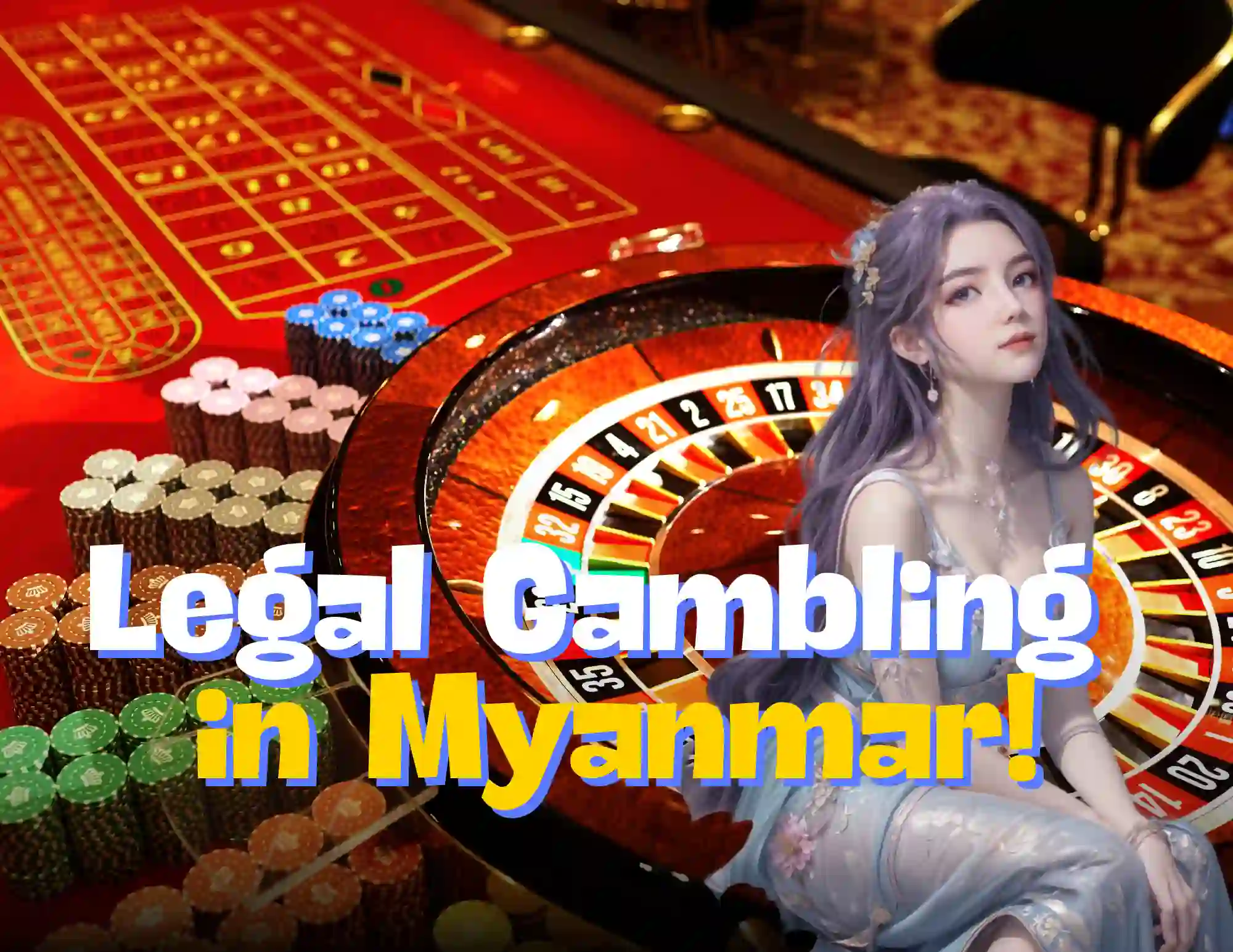Legal Gambling in Myanmar
Myanmar, once known as Burma, has a rich and complex history when it comes to gambling. From traditional forms of gambling to the more recent introduction of legal gambling, the country has navigated a unique path in this realm. This article digs into the intricacies of legal gambling in Myanmar, exploring its historical context, regulatory framework, various legal gambling activities, impact on society and the economy, and measures to promote responsible gambling.

Historical Context
Traditional Forms of Gambling in Myanmar
Gambling has been an integral part of Myanmar’s cultural landscape for centuries. Traditional forms of gambling, such as Chinlone (a conventional Burmese sport involving a woven rattan ball) and Lethwei (a form of conventiotraditionalboxing), have been practiced by Myanmar for generations. These activities often involved informal betting and wagers, reflecting the deep-rooted acceptance of gambling within the country’s cultural heritage.
The Rise of Casinos
The introduction of legal gambling in Myanmar can be traced back to the late 20th century. In the 1990s, the government of Myanmar began to explore the potential of the gambling industry as a source of revenue and economic growth. This led to the establishing of the first legal casinos in the country, primarily catering to foreign tourists and investors.
The Shift Towards Regulation
As the gambling industry in Myanmar gained momentum, the government recognized the need for a comprehensive regulatory framework. In the early 2000s, the authorities began to enact laws and regulations to govern the operations of casinos and other conditions of legal gambling. This shift towards regulation aimed to ensure the industry’s growth while mitigating potential social and economic risks.
Introduction of Legal Gambling in Myanmar
The legal gambling landscape in Myanmar has evolved significantly over the past few decades. While traditional forms of gambling have long been a part of the country’s cultural fabric, the government’s gradual embrace of legal gambling has reshaped the industry’s dynamics.
The Legalization of Casinos
One of the most notable developments in the legal gambling sector in Myanmar has been the legalization and expansion of casino operations. In the late 1990s, the government began granting domestic and international operators licenses to establish casinos within the country. These casinos have been strategically located near border regions, catering primarily to foreign visitors and investors.
The Rise of Sports Betting
In addition to the thriving casino industry, Myanmar has also witnessed the legalization and growth of sports betting activities. The government has recognized the growing demand for sports-related gambling, leading to the introduction of regulated sports betting markets. This has provided sports enthusiasts in Myanmar with new opportunities to engage in legal wagering on various sporting events.
Regulatory Framework
Licensing and Regulatory Oversight
The legal gambling industry in Myanmar is governed by a complex regulatory framework that involves several government agencies and authorities. The main regulatory body overseeing the gambling sector is the Myanmar Gaming Commission, established in the early 2000s.
The Myanmar Gaming Commission
The Myanmar Gaming Commission is tasked with licensing, regulating, and enforcing gambling activities within the country. This includes issuing and renewing licenses for casino operators, sports betting providers, and other gambling-related businesses. The Commission also sets guidelines and standards for the industry, ensuring compliance with relevant laws and regulations.
Licensing Requirements
To operate a legal gambling establishment in Myanmar, businesses must obtain the necessary licenses from the Myanmar Gaming Commission. The licensing process involves thoroughly reviewing the applicant’s financial stability, operational plans, and adherence to regulatory requirements. Licensees are subject to regular audits and assessments to ensure ongoing compliance.
Enforcement and Monitoring
The regulatory framework in Myanmar also encompasses robust enforcement and monitoring mechanisms to ensure the integrity of the gambling industry. The Myanmar Gaming Commission, in collaboration with law enforcement agencies, actively monitors the sector and takes swift action against any violations or illegal activities.
Penalties and Sanctions
The laws and regulations governing permitted gambling in Myanmar stipulate severe penalties and sanctions for non-compliance. These can include the revocation of licenses, hefty fines, and even criminal charges for individuals or entities engaging in unlawful gambling activities.
Collaboration with Stakeholders
The Myanmar Gaming Commission also emphasizes the importance of collaboration with various stakeholders, including casino operators, sports betting providers, and community organizations. This collaborative approach aims to foster a responsible and transparent gambling ecosystem that prioritizes the well-being of players and the general public.
Types of Legal Gambling
Myanmar’s legal gambling landscape encompasses a diverse range of activities, catering to the preferences and interests of both local and international patrons.
Casino Gaming
Casinos are at the forefront of legal gambling in Myanmar. These establishments offer a wide array of table games and slot machines, including popular options such as:
| Game | Description |
| Blackjack | It’s a classic card game where players aim to reach a hand value of 21 or come closer to it than the dealer. |
| Roulette | It is a game where players lay bets on the result of a spinning wheel and a ball that lands in one of the numbered slots. |
| Baccarat | It is a card game where players bet on the hand with a value closest to 9. |
| Slot Machines | Electronic games of chance where players spin reels and hope to fit symbols to win payouts. |
Casinos in Myanmar often feature the latest facilities, elegant accommodations, and a capacity of dining and entertainment options to cater to the various preferences of their clientele.
Sports Betting
The legalization of sports betting in Myanmar has opened up a new avenue for gambling enthusiasts. Regulated sports betting providers offer a variety of betting options, including:
- Football (soccer)
- Horse racing
- Boxing
- Volleyball
- Muay Thai (traditional Thai boxing)
Bettors can wager on the outcomes of these sporting events and various in-game metrics and statistics through licensed bookmakers and online platforms.
Lotteries and Raffles
In addition to casino gaming and sports wagering, Myanmar’s legal gambling landscape includes lotteries and raffles. The government often organizes and regulates these activities, with the proceeds contributing to various social welfare and development programs.
Impact on Society and Economy
The introduction and expansion of legal gambling in Myanmar have had significant implications for the country’s social and economic landscape.
Contribution to Government Revenue
One of the primary benefits of the legal gambling industry in Myanmar has been its contribution to the government’s revenue streams. The licensing fees, taxes, and other levies collected from gambling operators have provided substantial funding for various public programs and infrastructure development projects.
Allocation of Gambling Revenue
The government has strategically allocated a portion of the revenue generated from legal gambling to support social welfare initiatives, education, and healthcare. This approach aims to ensure that the economic benefits of the gambling industry are channeled back into the community.
Employment and Economic Opportunities
The legal gambling industry in Myanmar has also been a significant driver of economic growth and job creation. Casino resorts, sports betting providers, and other gambling-related businesses have generated numerous employment opportunities, ranging from hospitality and customer service to specialized technical and managerial positions.
Indirect Economic Impacts
Beyond the direct employment opportunities, the legal gambling industry has also stimulated broader economic activity. The influx of visitors to gambling establishments has increased demand for ancillary services, such as hotels, restaurants, transportation, and entertainment, further bolstering the local economy.
Social Considerations
While the economic benefits of legal gambling in Myanmar are evident, the industry has also raised social concerns that require careful consideration and mitigation.
Gambling Addiction and Problem Gambling
One of the primary challenges associated with the growth of the legal gambling industry is the potential for increased rates of gambling addiction and problem gambling. The government and regulatory authorities have recognized this problem and have implemented various measures to address it.
Responsible Gambling Initiatives
To promote responsible gambling practices, the Myanmar Gaming Commission has introduced a range of initiatives, including:
- Mandatory counseling and support services for individuals with gambling problems
- Regulations on advertising and marketing of betting products
- Restrictions on underage gambling and the implementation of age verification measures
- Collaborations with residents organizations and mental health professionals to raise awareness and provide treatment options
By addressing the social impact of legal gambling, the authorities in Myanmar aim to strike a balance between the economic benefits and the well-being of the population.
Responsible Gambling Measures
Myanmar’s regulatory framework for legal gambling includes a strong emphasis on responsible gambling practices to mitigate the potential social and economic risks associated with the industry.
Regulatory Oversight and Enforcement
The Myanmar Gaming Commission is pivotal in ensuring the responsible operation of gambling establishments and activities. This includes:
- Imposing strict licensing requirements and ongoing monitoring of operators
- Enforcing regulations on advertising, marketing, and player protection
- Investigating and addressing reports of problem gambling and unethical practices
Collaboration with Stakeholders
The regulatory authorities in Myanmar have fostered close collaborations with various stakeholders, including:
- Casino operators and sports betting providers
- Mental health professionals and addiction treatment centers
- Community organizations and social welfare groups
These partnerships aim to develop comprehensive strategies to encourage responsible gambling and provide support services for individuals struggling with gambling-related issues.
Player Protection Measures
To safeguard the well-being of gamblers, the Myanmar Gaming Commission has implemented a range of player protection measures, such as:
- Mandatory self-exclusion programs that allow individuals to ban themselves from gambling establishments
- Restrictions on the maximum amount that can be wagered or lost within a specified time frame
- Mandatory display of responsible gambling information and resources at gambling venues
These measures authorize individuals to make informed decisions and seek help if they experience difficulties with gambling.
Addiction Treatment and Support Services
The government of Myanmar, in collaboration with healthcare providers and community organizations, has established a network of addiction treatment and support services specifically tailored to address gambling-related issues. These services include:
- Counseling and therapy for individuals with gambling problems
- Rehabilitation programs and support groups for individuals and their families
By investing in these comprehensive responsible gambling measures, Myanmar aims to foster a gambling industry that prioritizes the well-being of its citizens while ensuring the industry’s sustainable growth.
Conclusion
Legal gambling in Myanmar has evolved significantly over the past few decades, transitioning from a largely unregulated industry to a sector governed by a comprehensive regulatory framework. The introduction of casinos, sports betting, and other legal gambling activities has generated economic benefits for the country, contributing to government revenue, employment opportunities, and broader economic development.
However, the growth of the legal gambling industry has also raised social concerns, particularly regarding the prospect of increased gambling addiction and problem gambling. In response, the Myanmar Gaming Commission and other regulatory authorities have implemented various responsible gambling measures, including player protection mechanisms, addiction treatment services, and collaborative initiatives with stakeholders.
The future of legal gambling in Myanmar remains promising, with the prospect for further expansion and innovation, provided that the industry continues to evolve in a socially responsible manner. By striking the right balance between economic development and social well-being, Myanmar can foster a gambling industry that contributes positively to the nation’s long-term prosperity.









